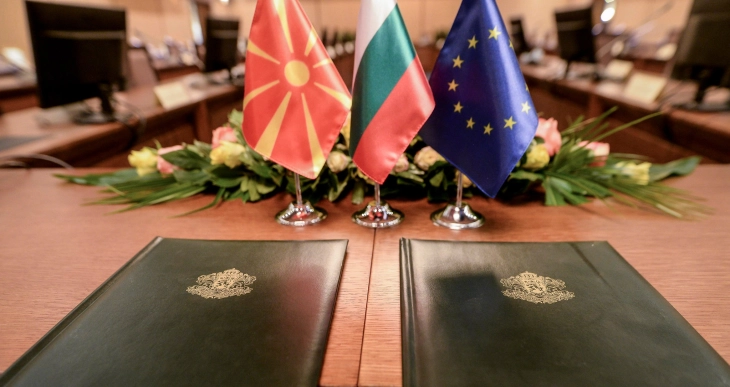Siljanovska-Davkova: It’s an illusion to think that adding Bulgarians to the preamble will kick off the negotiation process
- We are not at all a financial or budgetary burden for the EU. We have always been geographically, historically, and culturally part of the EU, and we have proven to be cooperative, even leading a European foreign and security policy. If anyone thinks that the process will start the moment we include the Bulgarians in the preamble, I believe that is again an illusion, President Gordana Siljanovska-Davkova told Kanal 5 TV Thursday evening.
- Post By Silvana Kocovska
- 21:52, 4 July, 2024

Skopje, 4 July 2024 (MIA) - We are not at all a financial or budgetary burden for the EU. We have always been geographically, historically, and culturally part of the EU, and we have proven to be cooperative, even leading a European foreign and security policy. If anyone thinks that the process will start the moment we include the Bulgarians in the preamble, I believe that is again an illusion, President Gordana Siljanovska-Davkova told Kanal 5 TV Thursday evening.
Siljanovska-Davkova noted that the negotiating framework is a legal fact, but she assessed that it is possible, in good faith, to agree that Bulgaria will not use the veto for what is already prohibited by the Prespa Agreement – history, culture, heritage...
Asked whether she plans to visit Brussels for the start of negotiations, the president said that she "has met with almost all the people currently in positions there, which gives her hope that there will be some continuity in the attitude towards enlargement."
“I cannot say whether I will convince them, but I have an obligation as president to defend the state and national interests and to try to persuade them. I have a problem with those who have not tried to present any of what I am saying and now believe again that just this, just changing the Constitution, will solve the problem,” Siljanovska-Davkova said.

Asked when the conditions for renegotiating EU membership terms will be created, Siljanovska-Davkova said that the negotiating framework is indeed a legal fact, but that a broad debate has also developed within the EU on unblocking enlargement. "Non-papers" and studies have emerged on how to limit the use of the veto because of what is happening.
“The veto won't stop with us, you can be sure of that, and then the entire enlargement process will be at risk. After all, the EU without the Western Balkans is an unfinished symphony, and we are its Achilles' heel. What I'm saying is, it's no coincidence that all these discussions and proposals are happening. They suggest that the veto can only be used at the beginning or at the end, or at both the beginning and the end, but not in between. Let me remind you of our proposal, that we have already had a deferred implementation of some provisions, and that this can also be agreed upon. It can be arranged in good faith that Bulgaria will not use the veto for what is prohibited by the Prespa Agreement, such as history, culture, and heritage. If anyone thinks that the process will start the moment we include the Bulgarians in the Preamble, I believe that is again an illusion. So there can be deferred implementation, there can be interpretation; we can start negotiations without Bulgaria vetoing us in order to build friendly relations. We will speed up our efforts to meet the Copenhagen criteria, and Bulgaria will show goodwill and not block us, so we will meet our goals faster. Both the changes will come into effect, and we will become friends,” Siljanovska-Davkova noted.
Regarding how the European elections and the rise of the far-right in France could jeopardize the enlargement process, Siljanovska-Davkova pointed out that the EU will need to fight for democracy, as the far-right is Eurosceptic and lacks understanding of the enlargement process.
"You see how few citizens actually vote in the European Parliament elections. This shows that we need to reconsider the internal dynamics between the European Parliament, the Commission, and the Council. Many experts in this field believe that for a democracy to work, the EP should function as a lower house, the EC as the government, and the Council as the upper house. If the Council continues to hold the final say on enlargement both at the beginning and the end, where heads of state and government meet, then the EU is not truly a community based on fundamental values and principles,” Siljanovska-Davkova said.
“We need to reflect on and seriously address the issues of the veto and the demand for broader application or the scaling down of the two-thirds majority requirement in the enlargement process. This calls for a responsible approach from the EU. I believe it is time for a significant step forward on enlargement, and that will make things easier,” Siljanovska-Davkova said.
Photo: MIA archive







